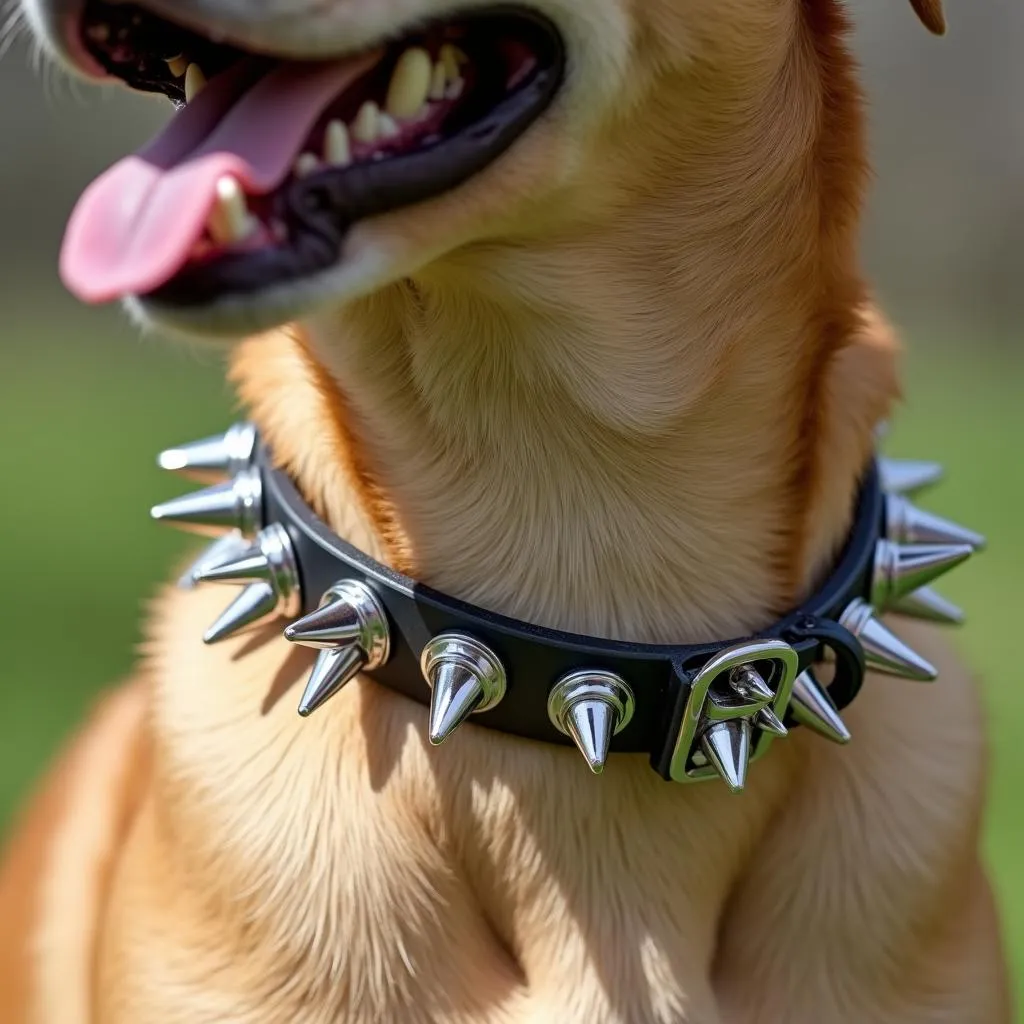“Cái răng cái vẩu, cái nết cái tôi”, they say in Vietnamese. This translates to “A person’s appearance and their personality can be very different”, and it’s a great saying to consider when it comes to training your dog. Just like humans, dogs have different personalities, and some may be more challenging to train than others. For those dealing with particularly strong-willed or aggressive dogs, you might wonder if a spiked collar could be the answer. But, are spiked collars for dog training really effective, and are they safe? Let’s dive into the details.
What Are Spiked Collars and How Do They Work?
Spiked collars, also known as pinch collars or prong collars, are made from metal with a series of prongs that are designed to apply pressure to a dog’s neck when they pull on the leash. This pressure is intended to discourage pulling and redirect their behavior.
 Spiked collar for dog training
Spiked collar for dog training
Are Spiked Collars Effective for Dog Training?
Many dog trainers believe that spiked collars can be effective in certain situations. They can be useful for dogs who pull excessively on the leash, are prone to jumping, or exhibit aggressive behavior. By applying pressure to the neck, the collar creates a negative association with pulling, encouraging the dog to stop the behavior.
However, it’s important to note that effectiveness depends heavily on the individual dog and the skill of the trainer. Spiked collars are not a magic solution, and they can also be counterproductive if used incorrectly.
What Are the Potential Risks of Using Spiked Collars?
Spiked collars can be dangerous if used improperly. They can cause:
- Neck injuries: The prongs can cause skin punctures, bruising, and even nerve damage.
- Behavioral problems: Spiked collars can create fear, anxiety, and aggression in dogs.
- Over-reliance: Some owners might become overly reliant on the collar, neglecting the importance of proper training techniques.
When to Avoid Using Spiked Collars
It’s essential to consult a professional dog trainer before using any type of spiked collar. In some cases, spiked collars are not recommended, such as:
- Young dogs: Puppies’ necks are still developing and can be easily injured.
- Small dogs: The prongs can be too large and cause significant discomfort.
- Dogs with skin conditions: Spiked collars can irritate sensitive skin.
- Dogs with anxiety or aggression: Using a spiked collar on an anxious or aggressive dog can worsen the situation.
Alternatives to Spiked Collars
Several other training tools can help you control your dog’s behavior without resorting to spiked collars. Some alternatives include:
- Harnesses: Harnesses distribute pressure evenly across the chest, making them more comfortable and less likely to cause injury.
- Positive reinforcement training: This method uses rewards and praise to encourage desired behaviors.
- Head collars: Head collars work by gently redirecting the dog’s head, preventing them from pulling.
Price Considerations
The price of spiked collars can vary depending on the size, material, and brand. You can typically find them for around $15-30. But remember, it’s always better to invest in a high-quality collar made from durable materials to avoid potential injuries.
Safety Precautions
If you decide to use a spiked collar, it’s crucial to prioritize safety:
- Proper fit: Make sure the collar fits snugly but not too tight.
- Supervise your dog: Always supervise your dog when wearing a spiked collar.
- Avoid harsh corrections: Use gentle pressure and focus on positive reinforcement.
- Consider alternatives: If you see any signs of discomfort or aggression, immediately stop using the collar and consult a professional dog trainer.
Dog Training in Hanoi
If you’re in Hanoi and need assistance with dog training, check out some of the reputable dog trainers and training centers located in the city. You can easily find them online or ask for recommendations from fellow dog owners.
Conclusion
Spiked collars can be effective for certain dogs, but they also come with risks. Using them without proper knowledge and understanding can lead to injuries and behavioral problems. Always consult a professional dog trainer before using any type of training tool. Focus on positive reinforcement and create a safe and enjoyable training experience for your dog. If you have any further questions or need any assistance with your dog’s training, please contact our customer service team at 0372960696 or email us at [email protected]. Our team is available 24/7 to help you and your furry friend!
Leave a Reply
You must be logged in to post a comment.